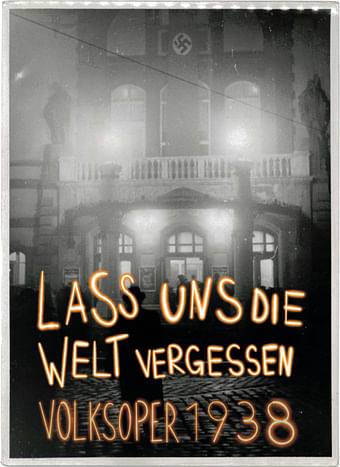Lass uns die Welt vergessen – Volksoper 1938
5 reasons why it is important for us to show you this production
The year is 1938 and the production team of the operetta Gruß und Kuss aus der Wachau is working flat out to bring this revue operetta to the stage. The rehearsal room is dedicated solely to the ideal operetta world, the terrible political and social experiences are to be shut out. But what happens when that is no longer possible? This is the subject of Lass uns die Welt vergessen – Volksoper 1938.
5 reasons why it is important to us to show you this production:
- The history of the Volksoper - on the Volksoper stage
On the occasion of the 125th anniversary of the Volksoper, we bring a piece of our own history to the stage. In doing so, we remember the dark chapter of the events of 1938. As contemporary artists, by playing, singing, and embodying this history, we also look for traces that connect us with this history in the present. Only by not forgetting the past can we be prepared for the future. The stage, as a place where history comes alive, is the best place to do this work of remembrance. - The revue operetta returns to the Volksoper after 85 years
We not only want to commemorate the end of all those artists who were associated with the Volksoper for so long, we want above all to bring their art into the present and celebrate all the wonderful songs of the revue operetta that make Gruß und Kuss aus der Wachau so unique. For the first time in 85 years, numerous melodies will be heard again in the same hall for which they were composed. In 2023, you can once again hear and enjoy the irrepressible joie de vivre that flows from these melodies. - The ensemble of today plays the ensemble of then
Twenty-three performers make up the ensemble of Lass uns die Welt vergessen, providing an insight into the dynamics of the rehearsal process back then. Together, they embody their colleagues from 1938 and thus tie in with the artistic DNA of the Volksoper. Our ensemble manages to bring the artists from back then back to the place that was once their artistic home in the bodies of today. - A Musical Journey into Different Worlds
It is a world premiere with pre-existing music: composer and conductor Keren Kagarlitsky reconstructed the Jara Beneš score of Gruß und Kuss aus der Wachau, also incorporating music by Jewish composers such as Gustav Mahler, Arnold Schönberg, and Viktor Ullmann into the production, and created additional compositions. In this way, the score tells of carefree joy of life as well as melancholy and sorrow, of death as well as survival. - How Would We Have All Behaved?
An actress is removed from the production by the new authorities – another could take over her role. Colleagues are harassed, others look on without rebelling. Many take sides, even more remain silent. The production is a self-examination for all involved: How would we all have behaved back then? But also: How would we behave today in a similar situation? We pass on these questions to our audience. Not to judge, but to understand.
